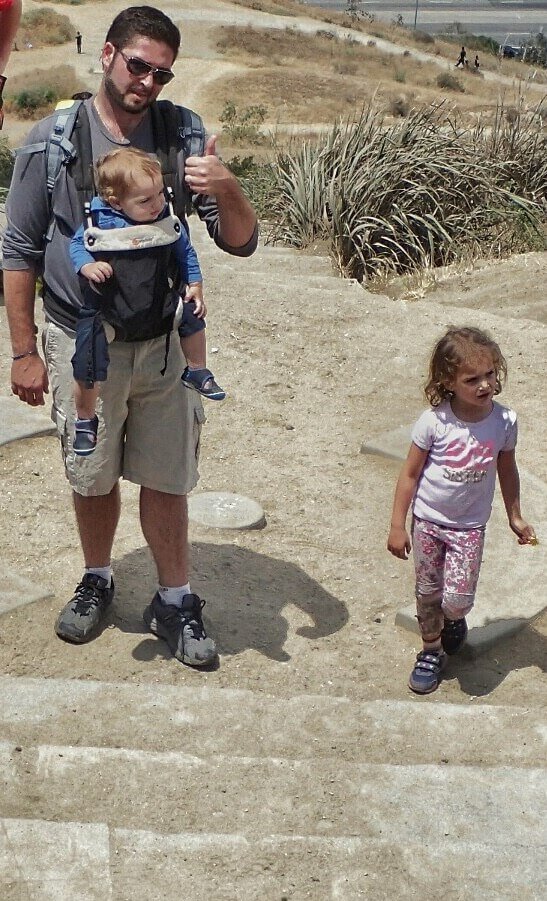
Dads in Modern Families: A Fathers’ Day post
by Eli Lipmen
My dream never was to become a stay-at-home dad. In fact, I was working on a successful career as a nonprofit leader. It was my wife who, despite also working, was planning to take on the primary role of caregiver while I became the “breadwinner”. While we are a cis heterosexual family with two children, we were not a “traditional” family by any means—for example, rather than “taking” my name when we got married, my wife and I combined the first part of my last name (Lipschultz) with her last name (Tamen) and created Lipmen.
Our plan was for me to be actively involved in their upbringing, while she would “take care” of the kids. But as we were about to welcome our second child, I decided to leave a terrible work environment with almost no parental leave to spend more time raising my family. I felt that I would rather spend time with my kids than be stuck at a place I didn’t like just to pay for a nanny watch my kids.
However, the prospect of being the primary caregiver was terrifying, especially with a baby on the way. Would I be good at it? Would my kids like me? Could I keep up with the constant barrage of cooking, cleaning carpool, activities, diapering, burping, and crying? Being asked 50 times for ice cream and saying no every time? Sleepless nights when it felt like both kids were conspiring to keep me awake? And how would it impact my relationship with my wife? Would she be jealous?
What was most terrifying was that I had no role models to teach me. I was the only at-home dad at my three-year-old’s preschool. My dad was always there for me growing up but maintained a 9-to-5 career and my father-in-law was rarely involved in raising my wife and her siblings.
My only experience with a stay-at-home dad was Eddie Murphy and Jeff Garlin in the movie Daddy Day Care. You know, the comedy with the clueless dads who start up a day care and can’t even get their kids to go potty on the toilet (and not the walls, ceilings, and everywhere else)? That movie wasn’t exactly an instruction manual.
But then I realized, hey, I live in Los Angeles in 2015—there have to be other dads out there like me.
Turns out there were – since the early 2000s (when Daddy Day Care was in theaters), the number of stay-at-home dads has doubled.
I soon was introduced to the City Dads, At-Home Dad Network, and Dad 2.0 Summit—communities of dads who had, either by choice or for economic reasons, become the primary caregivers to their children. There was even a playgroup just for dads in Los Angeles that hosted weekly events for stay-at-home dads. It opened up my eyes to a growing group of fathers who were not only taking care of their kids full-time but supporting each other through blogging, vlogging, snapping, and photographing their experiences. As a social media expert and blogger, these were my kind of guys!
This support was great. But in the process of caring for my kids, I also experienced the challenges and stigmas faced by at-home dads. In most American families an at-home-by-choice father—who is not the breadwinner—is unusual; this despite changing attitudes towards “non-traditional” households—everything from single parents to gay parents. Some people viewed our family’s decision with admiration (“I always wanted to do that”) while others, including my extended family, looked at it with derision (“but how do you earn money?”).
Rather than be embarrassed amongst other “breadwinning” dads, I would avoid talking about my primary role as caregiver and instead, talk about some of my other projects (part-time jobs, volunteer work, blogging, etc.). It has also been a difficult adjustment for my wife, who has been completely supportive of me and our family arrangement, but has had to fend off criticism over our decision from family, friends, and colleagues.
Wherever I went—to the park, library, or a “mommy and me” class—I was almost always surrounded by moms…or even nannies! When the conversation invariably shifted to a topic like breastfeeding, I would either nod respectfully or quietly move on. But nothing was more frustrating when someone condescendingly said: “it is sweet that you are babysitting” or “you are doing a good job” as if I were doing my wife a favor. Mostly, I would politely thank them and then fume about it for the rest of the day. But every now and then, I would proudly declare my stay-at-home-dad status, displaying my Ergobaby carrier, overstuffed Jonathan Adler Skip Hop diaper bag, and applesauce-stained City Dads Group t-shirt with Cheerios falling out of my pockets as a badge of honor.
Since becoming the primary care-giver a year and a half ago, I have been inspired by the changing role of fatherhood in our society. When I left my job, it felt like parental leave was going in the wrong direction because my employer and the employers I had known were only offering vacation and sick days as “paid parental leave.”
Thankfully, we have seen a shift in the opposite direction as companies like Coca-Cola changed their policies on paid leave for parents, top corporate CEOs like Mark Zuckerberg publicly took time off to spend with their newborn, and states like New York and California have passed or expanded paid parental leave programs.
Now, more fathers are becoming integrally involved in their child’s formative years and this is both redefining the role of fathers in the family and having a positive impact on society, the child, and the parents. Dads spending more time with their kids can make a huge difference in their lives. Promundo, a global leader in promoting gender justice, published its State of World’s Fathers and found that fathers’ involvements yield huge benefits including:
- higher cognitive development and school achievement
- better mental health
- lower rates of delinquency in sons
- development of empathy and social skill
- boys’ acceptance of gender equality and to girls’ sense of autonomy and empowerment
As we celebrate Fathers’ Day, we must all—men, women, and children—work to get fathers more involved in childcare. Not only does it lead to happier and healthier men and their children, but it also has important economic benefits for women; a study from Sweden showed that every month that fathers took paternity leave increased the mother’s income by 6.7% four years later—more than what she lost by taking parental leave herself. Talk about pay equity!
And so on Fathers’ Day, I hope that my children recognize the positive impact of my new role as ‘modern at-home Dad’ on our whole family. And I hope that all parents, and even grandparents, reflect on their family’s specific needs rather than society’s general – and gendered – expectations of family roles. I also hope that, even though there are many kinds of families and models for parenting, that today’s dads (and moms too) play a more active role in raising their kid, because when raising them to be smarter, more empathetic, and better adults, I believe it can really make a difference.
Grok With Us:
- How have roles in your family changed from the way your parents or grandparents grew up?
- What can we all do to improve corporate and government policies on parental leave?
- If you are currently working, have you considered staying at home with your kids? If so, what is holding you back?
 Eli Lipmen is editor of the Los Angeles City Dads Group blog, a resource for dads in Los Angeles. He is raising two amazing children (a one-year-old and a four-year-old) while working part-time from home to help nonprofits raise money. He loves exploring all that Southern California has to offer—beaches, parks, museums, politics and more! You can find him on Twitter, Snapchat (elipmen), and Instagram talking about politics, the environment, or #badassparenting.
Eli Lipmen is editor of the Los Angeles City Dads Group blog, a resource for dads in Los Angeles. He is raising two amazing children (a one-year-old and a four-year-old) while working part-time from home to help nonprofits raise money. He loves exploring all that Southern California has to offer—beaches, parks, museums, politics and more! You can find him on Twitter, Snapchat (elipmen), and Instagram talking about politics, the environment, or #badassparenting.


Grok Nation Comment Policy
We welcome thoughtful, grokky comments—keep your negativity and spam to yourself. Please read our Comment Policy before commenting.